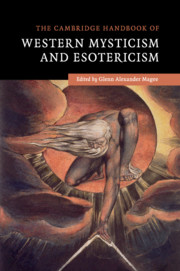Book contents
- Frontmatter
- Dedication
- Contents
- Acknowledgments
- Editor's Introduction
- List of contributors
- I ANTIQUITY
- 1 Ancient Mysteries
- 2 Pythagoras and Pythagoreanism
- 3 Parmenides and Empedocles
- 4 Plato, Plotinus, and Neoplatonism
- 5 Hermetism and Gnosticism
- 6 Early Jewish Mysticism
- 7 Early Christian Mysticism
- II THE MIDDLE AGES
- III THE RENAISSANCE AND EARLY MODERNITY
- IV THE NINETEENTH CENTURY AND BEYOND
- V COMMON THREADS
- Suggestions for Further Reading
- Index
- References
3 - Parmenides and Empedocles
from I - ANTIQUITY
Published online by Cambridge University Press: 05 May 2016
- Frontmatter
- Dedication
- Contents
- Acknowledgments
- Editor's Introduction
- List of contributors
- I ANTIQUITY
- 1 Ancient Mysteries
- 2 Pythagoras and Pythagoreanism
- 3 Parmenides and Empedocles
- 4 Plato, Plotinus, and Neoplatonism
- 5 Hermetism and Gnosticism
- 6 Early Jewish Mysticism
- 7 Early Christian Mysticism
- II THE MIDDLE AGES
- III THE RENAISSANCE AND EARLY MODERNITY
- IV THE NINETEENTH CENTURY AND BEYOND
- V COMMON THREADS
- Suggestions for Further Reading
- Index
- References
Summary
Introduction
To know the early Greeks, we must understand the lens through which we see them. That lens was powerfully shaped by later Greeks, foremost among them Plato and Aristotle, who developed the methods of ordered inquiry and formal argument that are foundational to Western rationalism. In the eyes of Plato and Aristotle, the works of their predecessors were fruitful but primitive, as they relied just as heavily on artful speech as they did on self-conscious argumentation, thereby demonstrating their inability to comprehend the difference. Thus, their notion of truth was contaminated by rhetoric. As a result, it became the distinct and primary task of the philosopher to explain how inquiry was to be purified from the irrationalities that plagued early Greek thought.
This newfound concern marked a profound shift in mentality among the Greeks, giving rise to the faculty of critical distance (in contrast to the poetic association of images) as the accepted standard in making claims of truth. While this development undeniably advanced the clarity and organizational power of the Western intellect, it also perpetuated a myopic view of the early Greeks by placing their works within a historical narrative that culminated in the achievements of rationalism. Consequently, major features of their works were pushed aside, while others were disproportionately emphasized to accommodate the view that the earlier Greeks had been trying – and failing – to accomplish the same ends as the later Greeks.
Given this context, the task of reading Parmenides and Empedocles must address certain distortions, foremost among them the long-standing dictum that all religious or poetic content in their works was extraneous to their true concerns. Such conceptual partitioning, however, comes from an external agenda that caused such a restriction in focus among early readers that large sections of Parmenides's and Empedocles's poems were inadvertently left unpreserved for future generations. The resulting damage to their works is extensive but fortunately does not preclude a more faithful reading, the goal of which would be to refrain from importing concepts – such as Plato's rigid distinction between reason and sense experience – that disrupt the natural flow of the texts.
- Type
- Chapter
- Information
- Publisher: Cambridge University PressPrint publication year: 2016

